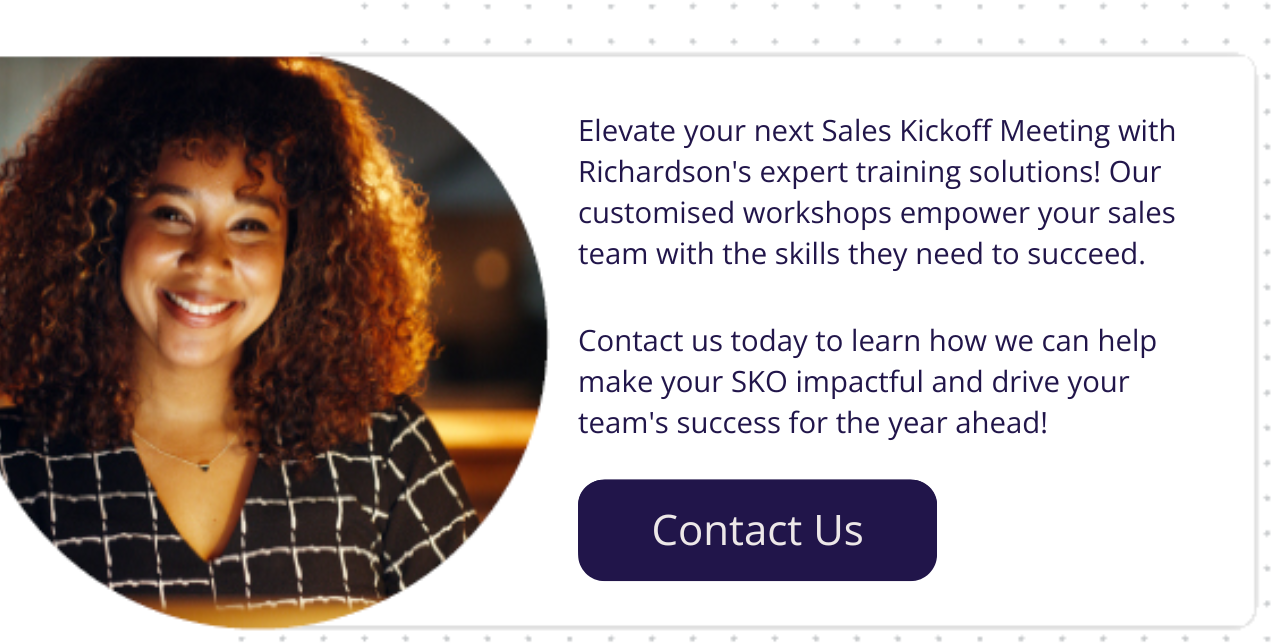Best Practises for Sales Kickoff Meetings (SKO): A Guide to Effective SKO Planning
Sales enablement

A successful sales kickoff meeting (SKO) is more than just a corporate tradition—it’s a pivotal moment to equip your sales team with the skills and strategies they need to excel in the coming year. While SKOs are often packed with updates, product information, and motivational speeches, training is the critical component that transforms the event from a morale booster into a driver of lasting performance improvement.
Below are the best practices to ensure that training is at the heart of your SKO planning, creating a foundation for a successful year ahead.
Make Training the Core of Your SKO Agenda
When planning a sales kickoff meeting, training should not be an afterthought—it must be central to your agenda. The most impactful SKOs are those that equip sales teams with the skills they need to succeed in real-world selling environments.
Every session in your SKO should tie back to a learning objective or skill development. Rather than filling your agenda with presentations and updates, focus on practical, hands-on training that aligns with your company’s sales strategy. This approach not only energises your team but also sets them up for long-term success.
Align Training to Sales Competencies and Corporate Strategy
To make training truly effective, it must be tailored to the specific competencies your salespeople need to succeed. During SKO planning, identify the most critical skills for your team—whether it’s negotiation, prospecting, or handling objections—and make sure your training sessions focus on these areas.
Moreover, training should always be aligned with the broader corporate strategy. If your company is focusing on penetrating new markets or launching a new product, the SKO training should reflect those priorities. Training sessions that directly support the company’s goals are more likely to engage the team and drive meaningful outcomes.
Provide Hands-On Training
To make training sessions at your sales kickoff meeting truly impactful, they should go beyond theory. Salespeople thrive when given the chance to practice what they’ve learned in a safe environment. Hands-on, interactive training—whether through role-playing, breakouts, or workshops—helps solidify new skills and makes it easier for sales reps to apply them in their day-to-day activities.
SKO planning should prioritise breakout sessions where salespeople can practice skills in smaller groups. This not only increases engagement but also ensures that training has a lasting impact. If smaller groups aren't feasible, even large-group sessions should include practical exercises to ensure active learning.
Include Follow-Up Plans
One of the main reasons to make training the core of your sales kickoff meeting is that it provides a measurable, lasting impact. However, to ensure that this impact endures beyond the SKO itself, follow-up is critical.
Each training session should include a clear call to action and a post-SKO follow-up plan. Whether through additional training sessions, online modules, or regular check-ins, the goal is to reinforce the learning throughout the year. Without this ongoing reinforcement, the lessons from the SKO training risk being forgotten.
Focus on Measurable Outcomes
To prove the value of your sales kickoff meeting and the training it includes, it’s important to measure outcomes. This means that your training sessions should be designed with specific, measurable goals in mind. For instance, if a training session focuses on negotiation skills, the desired outcomes could include increased deal sises or reduced discounting.
During your SKO planning, establish key sales performance indicators (KPIs) tied to each training session, and track these metrics in the months following the event. The data will not only demonstrate the success of your SKO but will also help refine training for future events.
Prioritise Depth Over Breadth
When incorporating training into your sales kickoff meeting, it’s essential to allocate enough time for it to be meaningful. Rushing through training or trying to cover too many topics dilutes its effectiveness. Instead, focus on a few key skills and provide ample time for your team to absorb and practice them.
Some of the most successful SKOs dedicate entire days to training, ensuring that the sales team leaves with concrete skills they can apply immediately. If your SKO only has a limited amount of time for training, be realistic about the outcomes you expect. For shorter sessions, focus on introducing concepts or reviewing critical skills rather than expecting dramatic behaviour changes.

Training At Your Sales Kickoff Meeting
Sales kickoffs are great opportunities to organise and energize a sales team They’re also opportunities to train or introduce a training initiative.
Learn MoreFoster Engagement and Buy-In
Salespeople are more likely to engage with a sales kickoff meeting when they see that the event is designed to improve their skills and help them succeed. By prioritising training, your SKO sends a clear message: the company is invested in its salespeople’s development and success.
Training also boosts confidence. When salespeople feel prepared and equipped with the right tools, they’re more likely to buy into the company’s goals and strategy. This alignment between skills and strategy is essential for driving results throughout the year.
A successful sales kickoff meeting (SKO) isn’t just about excitement and motivation—it’s about equipping your sales team with the tools and skills they need to excel. Training should be the backbone of your SKO planning because it delivers the long-term, measurable impact that makes these events truly worth the investment.
By making training the central focus of your sales kickoff meeting, you’re not only preparing your team for success but also ensuring that your SKO investment drives real, sustainable improvements in sales performance.


Commercial Selling Excellence: Role-based, Agile Sales Capabilities
Learn the capabilities and behaviors needed for each role within a sales organisation to stay competitive in the market.
DownloadGet industry insights and stay up to date, subscribe to our newsletter.
Joining our community gives you access to weekly thought leadership to help guide your planning for a training initiative, inform your sales strategy, and most importantly, improve your team's performance.






